Examining Ethics: Internet of Things, ACS Code, Utilitarian Theory
VerifiedAdded on 2023/06/13
|8
|2203
|273
Essay
AI Summary
This essay delves into the critical examination of ethics and professional practice within the context of modern technology and societal frameworks. It addresses the ethical challenges posed by the Internet of Things (IoT), emphasizing the absence of a robust ethical framework and the potential for misuse, as highlighted by the Mirai malware incident. The discussion extends to the Australian Computer Society's (ACS) code of ethics, focusing on its role in promoting professional behavior and addressing ethical issues within the ICT industry. Furthermore, the essay explores utilitarianism, contrasting act and rule utilitarianism, and examining the perspectives of key theorists like Jeremy Bentham and John Stuart Mill, to provide a comprehensive understanding of ethical decision-making in professional and technological contexts. Desklib provides access to similar solved assignments and study resources for students.
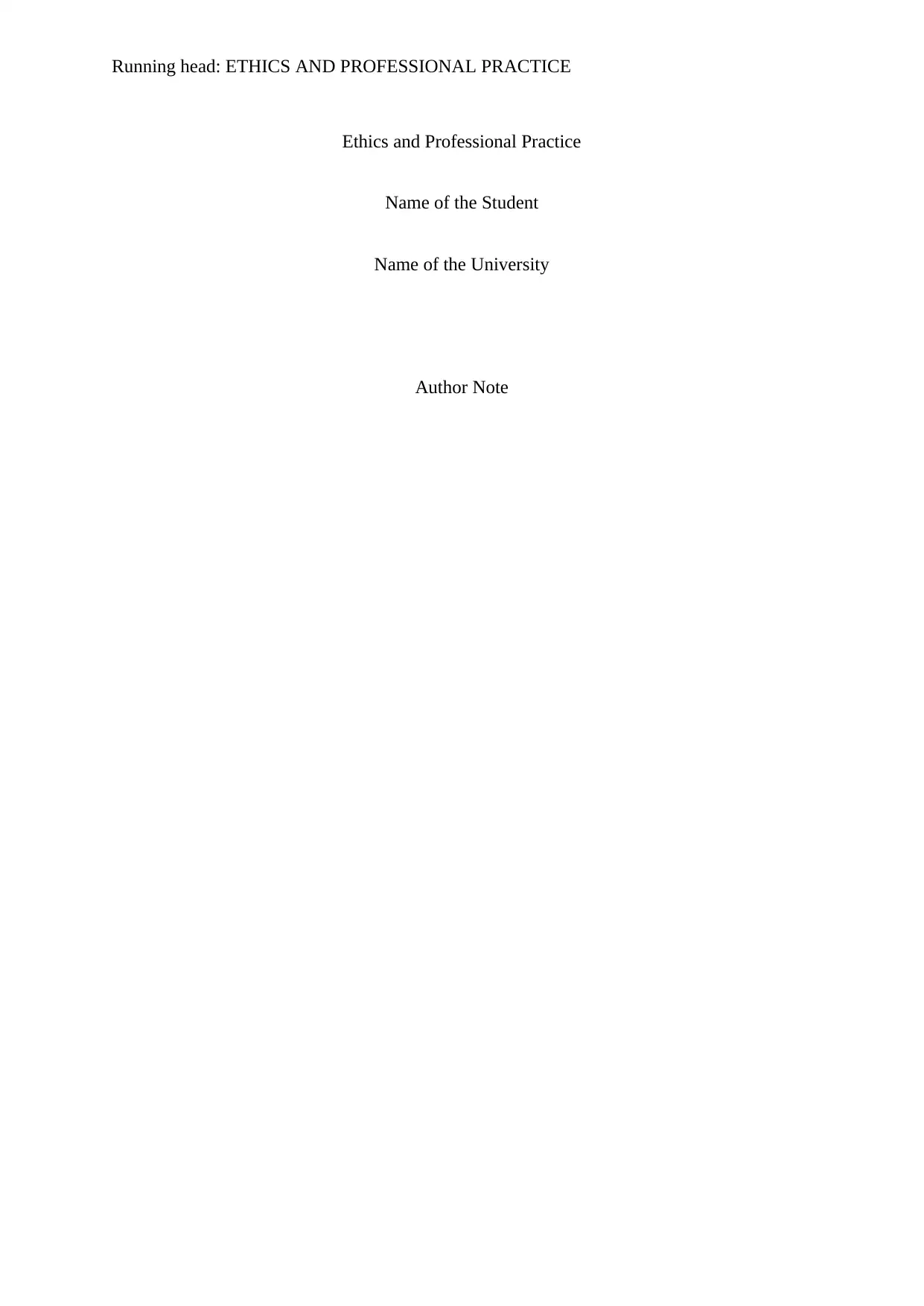
Running head: ETHICS AND PROFESSIONAL PRACTICE
Ethics and Professional Practice
Name of the Student
Name of the University
Author Note
Ethics and Professional Practice
Name of the Student
Name of the University
Author Note
Paraphrase This Document
Need a fresh take? Get an instant paraphrase of this document with our AI Paraphraser
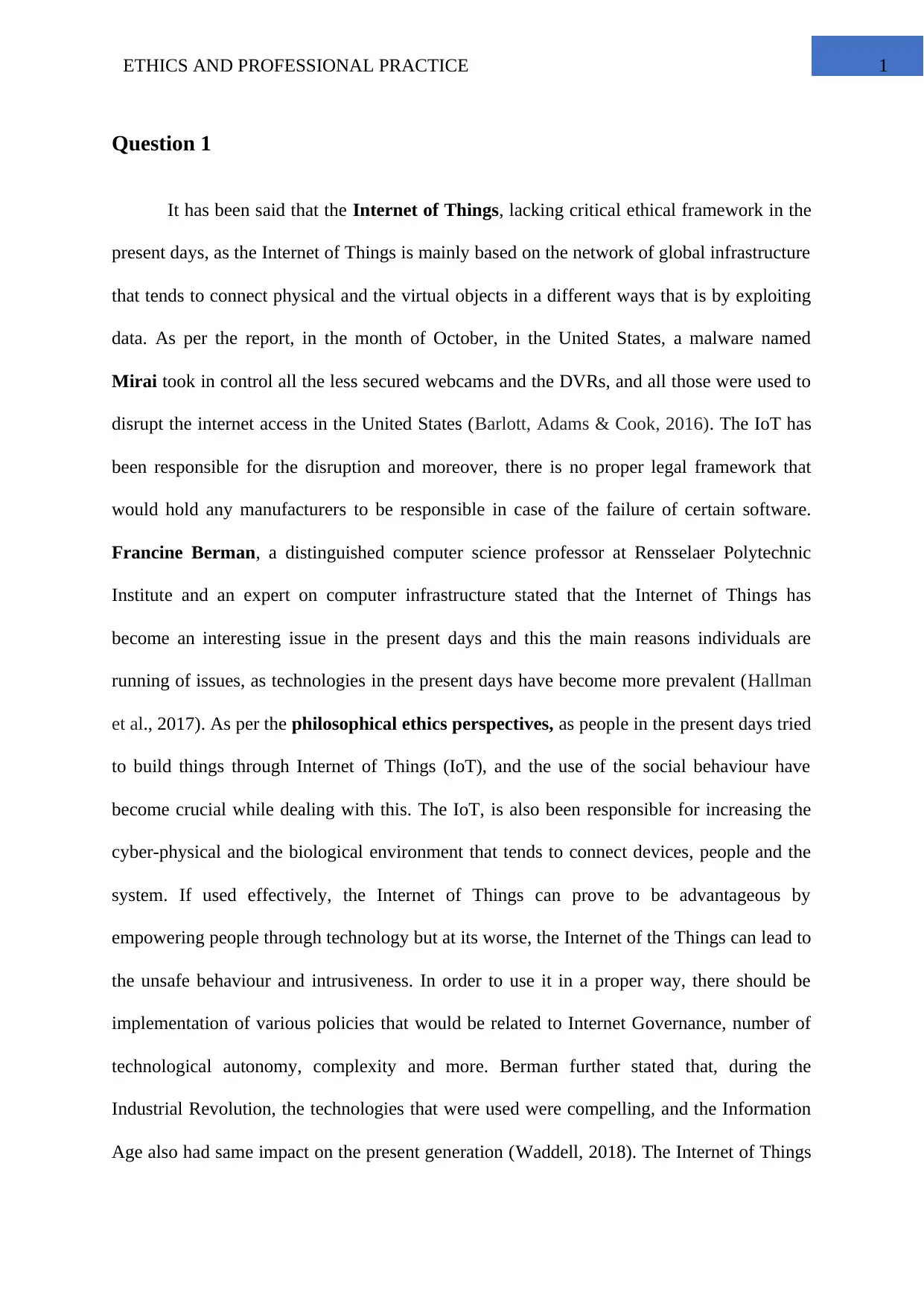
1ETHICS AND PROFESSIONAL PRACTICE
Question 1
It has been said that the Internet of Things, lacking critical ethical framework in the
present days, as the Internet of Things is mainly based on the network of global infrastructure
that tends to connect physical and the virtual objects in a different ways that is by exploiting
data. As per the report, in the month of October, in the United States, a malware named
Mirai took in control all the less secured webcams and the DVRs, and all those were used to
disrupt the internet access in the United States (Barlott, Adams & Cook, 2016). The IoT has
been responsible for the disruption and moreover, there is no proper legal framework that
would hold any manufacturers to be responsible in case of the failure of certain software.
Francine Berman, a distinguished computer science professor at Rensselaer Polytechnic
Institute and an expert on computer infrastructure stated that the Internet of Things has
become an interesting issue in the present days and this the main reasons individuals are
running of issues, as technologies in the present days have become more prevalent (Hallman
et al., 2017). As per the philosophical ethics perspectives, as people in the present days tried
to build things through Internet of Things (IoT), and the use of the social behaviour have
become crucial while dealing with this. The IoT, is also been responsible for increasing the
cyber-physical and the biological environment that tends to connect devices, people and the
system. If used effectively, the Internet of Things can prove to be advantageous by
empowering people through technology but at its worse, the Internet of the Things can lead to
the unsafe behaviour and intrusiveness. In order to use it in a proper way, there should be
implementation of various policies that would be related to Internet Governance, number of
technological autonomy, complexity and more. Berman further stated that, during the
Industrial Revolution, the technologies that were used were compelling, and the Information
Age also had same impact on the present generation (Waddell, 2018). The Internet of Things
Question 1
It has been said that the Internet of Things, lacking critical ethical framework in the
present days, as the Internet of Things is mainly based on the network of global infrastructure
that tends to connect physical and the virtual objects in a different ways that is by exploiting
data. As per the report, in the month of October, in the United States, a malware named
Mirai took in control all the less secured webcams and the DVRs, and all those were used to
disrupt the internet access in the United States (Barlott, Adams & Cook, 2016). The IoT has
been responsible for the disruption and moreover, there is no proper legal framework that
would hold any manufacturers to be responsible in case of the failure of certain software.
Francine Berman, a distinguished computer science professor at Rensselaer Polytechnic
Institute and an expert on computer infrastructure stated that the Internet of Things has
become an interesting issue in the present days and this the main reasons individuals are
running of issues, as technologies in the present days have become more prevalent (Hallman
et al., 2017). As per the philosophical ethics perspectives, as people in the present days tried
to build things through Internet of Things (IoT), and the use of the social behaviour have
become crucial while dealing with this. The IoT, is also been responsible for increasing the
cyber-physical and the biological environment that tends to connect devices, people and the
system. If used effectively, the Internet of Things can prove to be advantageous by
empowering people through technology but at its worse, the Internet of the Things can lead to
the unsafe behaviour and intrusiveness. In order to use it in a proper way, there should be
implementation of various policies that would be related to Internet Governance, number of
technological autonomy, complexity and more. Berman further stated that, during the
Industrial Revolution, the technologies that were used were compelling, and the Information
Age also had same impact on the present generation (Waddell, 2018). The Internet of Things
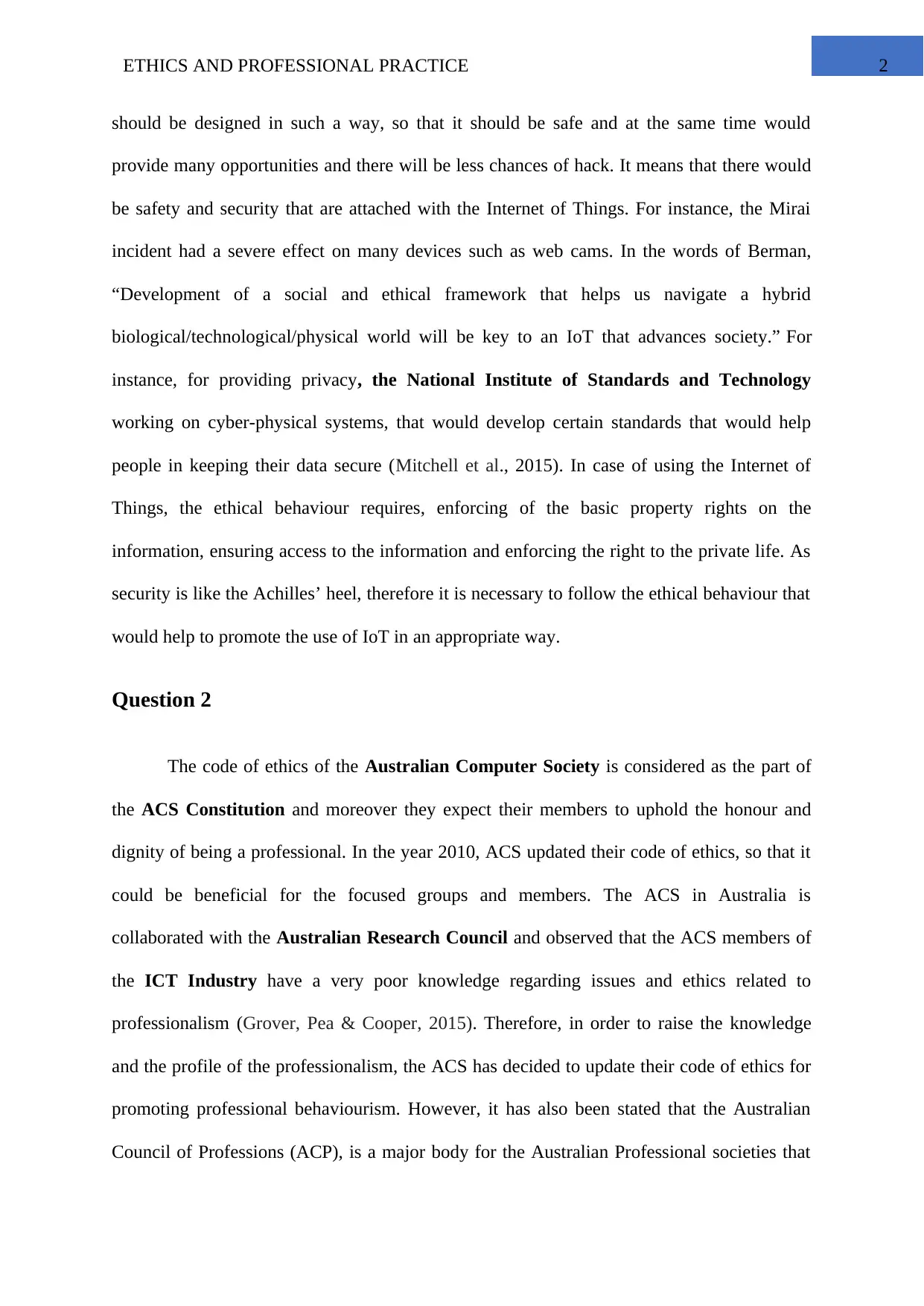
2ETHICS AND PROFESSIONAL PRACTICE
should be designed in such a way, so that it should be safe and at the same time would
provide many opportunities and there will be less chances of hack. It means that there would
be safety and security that are attached with the Internet of Things. For instance, the Mirai
incident had a severe effect on many devices such as web cams. In the words of Berman,
“Development of a social and ethical framework that helps us navigate a hybrid
biological/technological/physical world will be key to an IoT that advances society.” For
instance, for providing privacy, the National Institute of Standards and Technology
working on cyber-physical systems, that would develop certain standards that would help
people in keeping their data secure (Mitchell et al., 2015). In case of using the Internet of
Things, the ethical behaviour requires, enforcing of the basic property rights on the
information, ensuring access to the information and enforcing the right to the private life. As
security is like the Achilles’ heel, therefore it is necessary to follow the ethical behaviour that
would help to promote the use of IoT in an appropriate way.
Question 2
The code of ethics of the Australian Computer Society is considered as the part of
the ACS Constitution and moreover they expect their members to uphold the honour and
dignity of being a professional. In the year 2010, ACS updated their code of ethics, so that it
could be beneficial for the focused groups and members. The ACS in Australia is
collaborated with the Australian Research Council and observed that the ACS members of
the ICT Industry have a very poor knowledge regarding issues and ethics related to
professionalism (Grover, Pea & Cooper, 2015). Therefore, in order to raise the knowledge
and the profile of the professionalism, the ACS has decided to update their code of ethics for
promoting professional behaviourism. However, it has also been stated that the Australian
Council of Professions (ACP), is a major body for the Australian Professional societies that
should be designed in such a way, so that it should be safe and at the same time would
provide many opportunities and there will be less chances of hack. It means that there would
be safety and security that are attached with the Internet of Things. For instance, the Mirai
incident had a severe effect on many devices such as web cams. In the words of Berman,
“Development of a social and ethical framework that helps us navigate a hybrid
biological/technological/physical world will be key to an IoT that advances society.” For
instance, for providing privacy, the National Institute of Standards and Technology
working on cyber-physical systems, that would develop certain standards that would help
people in keeping their data secure (Mitchell et al., 2015). In case of using the Internet of
Things, the ethical behaviour requires, enforcing of the basic property rights on the
information, ensuring access to the information and enforcing the right to the private life. As
security is like the Achilles’ heel, therefore it is necessary to follow the ethical behaviour that
would help to promote the use of IoT in an appropriate way.
Question 2
The code of ethics of the Australian Computer Society is considered as the part of
the ACS Constitution and moreover they expect their members to uphold the honour and
dignity of being a professional. In the year 2010, ACS updated their code of ethics, so that it
could be beneficial for the focused groups and members. The ACS in Australia is
collaborated with the Australian Research Council and observed that the ACS members of
the ICT Industry have a very poor knowledge regarding issues and ethics related to
professionalism (Grover, Pea & Cooper, 2015). Therefore, in order to raise the knowledge
and the profile of the professionalism, the ACS has decided to update their code of ethics for
promoting professional behaviourism. However, it has also been stated that the Australian
Council of Professions (ACP), is a major body for the Australian Professional societies that
⊘ This is a preview!⊘
Do you want full access?
Subscribe today to unlock all pages.

Trusted by 1+ million students worldwide
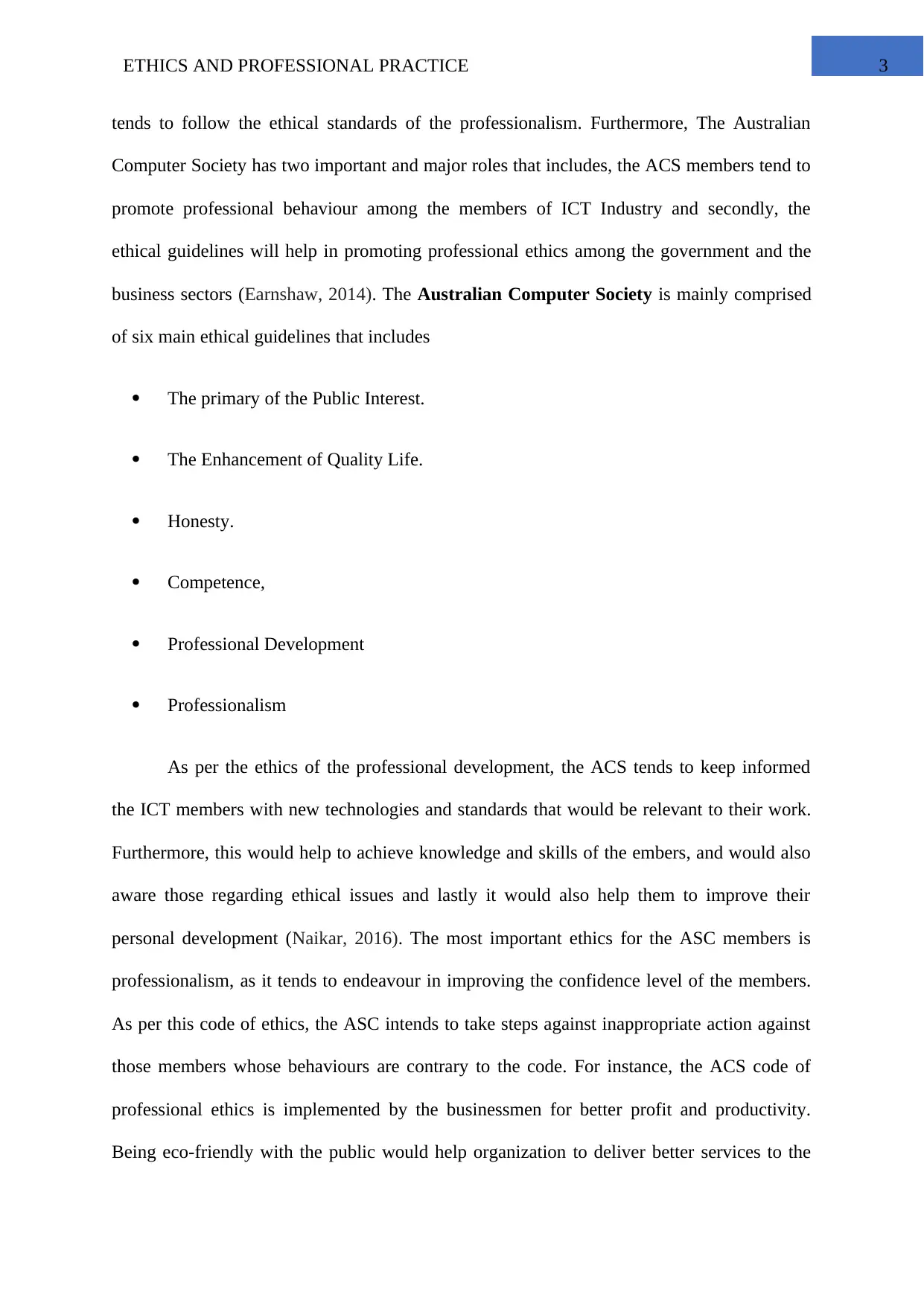
3ETHICS AND PROFESSIONAL PRACTICE
tends to follow the ethical standards of the professionalism. Furthermore, The Australian
Computer Society has two important and major roles that includes, the ACS members tend to
promote professional behaviour among the members of ICT Industry and secondly, the
ethical guidelines will help in promoting professional ethics among the government and the
business sectors (Earnshaw, 2014). The Australian Computer Society is mainly comprised
of six main ethical guidelines that includes
The primary of the Public Interest.
The Enhancement of Quality Life.
Honesty.
Competence,
Professional Development
Professionalism
As per the ethics of the professional development, the ACS tends to keep informed
the ICT members with new technologies and standards that would be relevant to their work.
Furthermore, this would help to achieve knowledge and skills of the embers, and would also
aware those regarding ethical issues and lastly it would also help them to improve their
personal development (Naikar, 2016). The most important ethics for the ASC members is
professionalism, as it tends to endeavour in improving the confidence level of the members.
As per this code of ethics, the ASC intends to take steps against inappropriate action against
those members whose behaviours are contrary to the code. For instance, the ACS code of
professional ethics is implemented by the businessmen for better profit and productivity.
Being eco-friendly with the public would help organization to deliver better services to the
tends to follow the ethical standards of the professionalism. Furthermore, The Australian
Computer Society has two important and major roles that includes, the ACS members tend to
promote professional behaviour among the members of ICT Industry and secondly, the
ethical guidelines will help in promoting professional ethics among the government and the
business sectors (Earnshaw, 2014). The Australian Computer Society is mainly comprised
of six main ethical guidelines that includes
The primary of the Public Interest.
The Enhancement of Quality Life.
Honesty.
Competence,
Professional Development
Professionalism
As per the ethics of the professional development, the ACS tends to keep informed
the ICT members with new technologies and standards that would be relevant to their work.
Furthermore, this would help to achieve knowledge and skills of the embers, and would also
aware those regarding ethical issues and lastly it would also help them to improve their
personal development (Naikar, 2016). The most important ethics for the ASC members is
professionalism, as it tends to endeavour in improving the confidence level of the members.
As per this code of ethics, the ASC intends to take steps against inappropriate action against
those members whose behaviours are contrary to the code. For instance, the ACS code of
professional ethics is implemented by the businessmen for better profit and productivity.
Being eco-friendly with the public would help organization to deliver better services to the
Paraphrase This Document
Need a fresh take? Get an instant paraphrase of this document with our AI Paraphraser
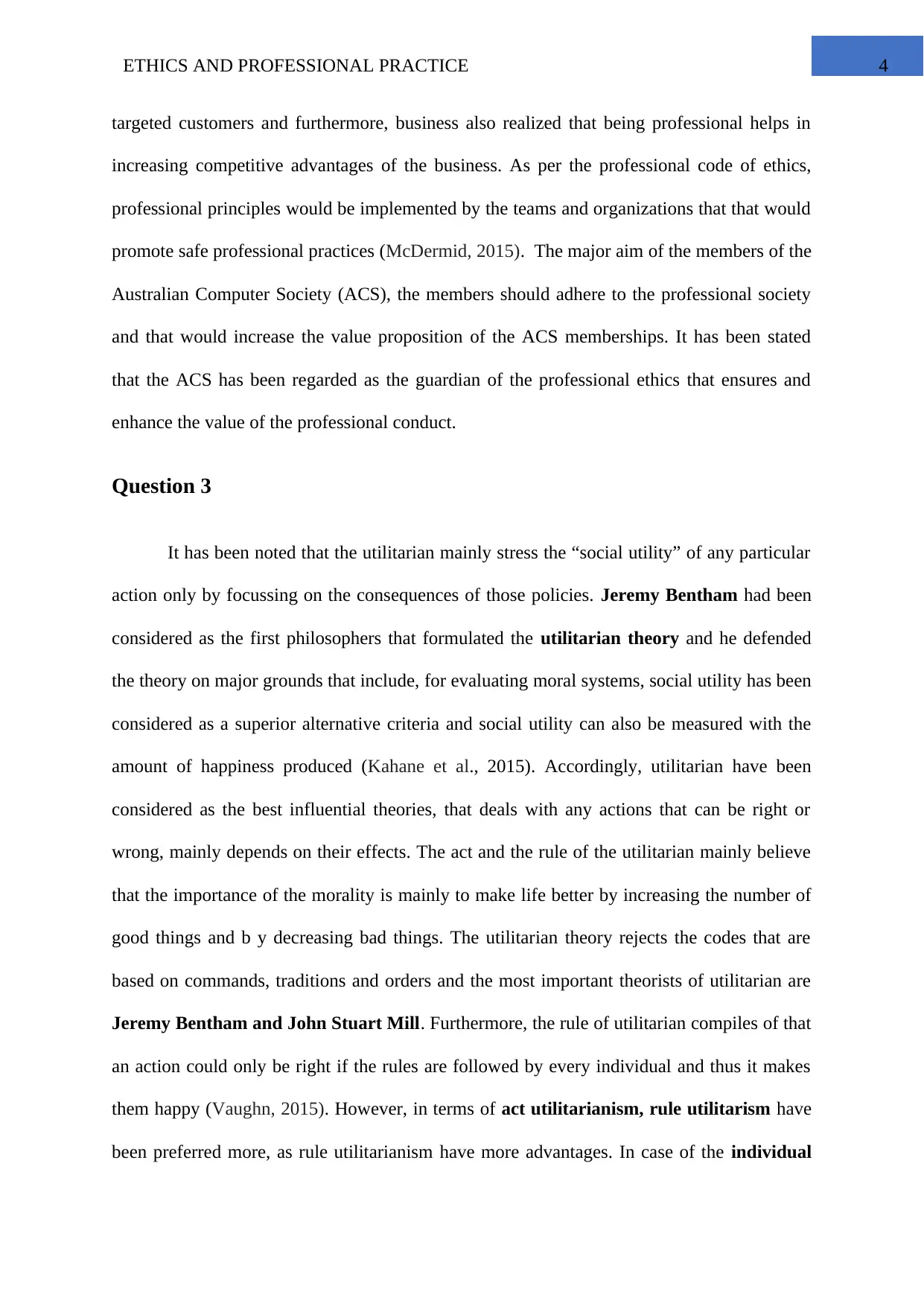
4ETHICS AND PROFESSIONAL PRACTICE
targeted customers and furthermore, business also realized that being professional helps in
increasing competitive advantages of the business. As per the professional code of ethics,
professional principles would be implemented by the teams and organizations that that would
promote safe professional practices (McDermid, 2015). The major aim of the members of the
Australian Computer Society (ACS), the members should adhere to the professional society
and that would increase the value proposition of the ACS memberships. It has been stated
that the ACS has been regarded as the guardian of the professional ethics that ensures and
enhance the value of the professional conduct.
Question 3
It has been noted that the utilitarian mainly stress the “social utility” of any particular
action only by focussing on the consequences of those policies. Jeremy Bentham had been
considered as the first philosophers that formulated the utilitarian theory and he defended
the theory on major grounds that include, for evaluating moral systems, social utility has been
considered as a superior alternative criteria and social utility can also be measured with the
amount of happiness produced (Kahane et al., 2015). Accordingly, utilitarian have been
considered as the best influential theories, that deals with any actions that can be right or
wrong, mainly depends on their effects. The act and the rule of the utilitarian mainly believe
that the importance of the morality is mainly to make life better by increasing the number of
good things and b y decreasing bad things. The utilitarian theory rejects the codes that are
based on commands, traditions and orders and the most important theorists of utilitarian are
Jeremy Bentham and John Stuart Mill. Furthermore, the rule of utilitarian compiles of that
an action could only be right if the rules are followed by every individual and thus it makes
them happy (Vaughn, 2015). However, in terms of act utilitarianism, rule utilitarism have
been preferred more, as rule utilitarianism have more advantages. In case of the individual
targeted customers and furthermore, business also realized that being professional helps in
increasing competitive advantages of the business. As per the professional code of ethics,
professional principles would be implemented by the teams and organizations that that would
promote safe professional practices (McDermid, 2015). The major aim of the members of the
Australian Computer Society (ACS), the members should adhere to the professional society
and that would increase the value proposition of the ACS memberships. It has been stated
that the ACS has been regarded as the guardian of the professional ethics that ensures and
enhance the value of the professional conduct.
Question 3
It has been noted that the utilitarian mainly stress the “social utility” of any particular
action only by focussing on the consequences of those policies. Jeremy Bentham had been
considered as the first philosophers that formulated the utilitarian theory and he defended
the theory on major grounds that include, for evaluating moral systems, social utility has been
considered as a superior alternative criteria and social utility can also be measured with the
amount of happiness produced (Kahane et al., 2015). Accordingly, utilitarian have been
considered as the best influential theories, that deals with any actions that can be right or
wrong, mainly depends on their effects. The act and the rule of the utilitarian mainly believe
that the importance of the morality is mainly to make life better by increasing the number of
good things and b y decreasing bad things. The utilitarian theory rejects the codes that are
based on commands, traditions and orders and the most important theorists of utilitarian are
Jeremy Bentham and John Stuart Mill. Furthermore, the rule of utilitarian compiles of that
an action could only be right if the rules are followed by every individual and thus it makes
them happy (Vaughn, 2015). However, in terms of act utilitarianism, rule utilitarism have
been preferred more, as rule utilitarianism have more advantages. In case of the individual
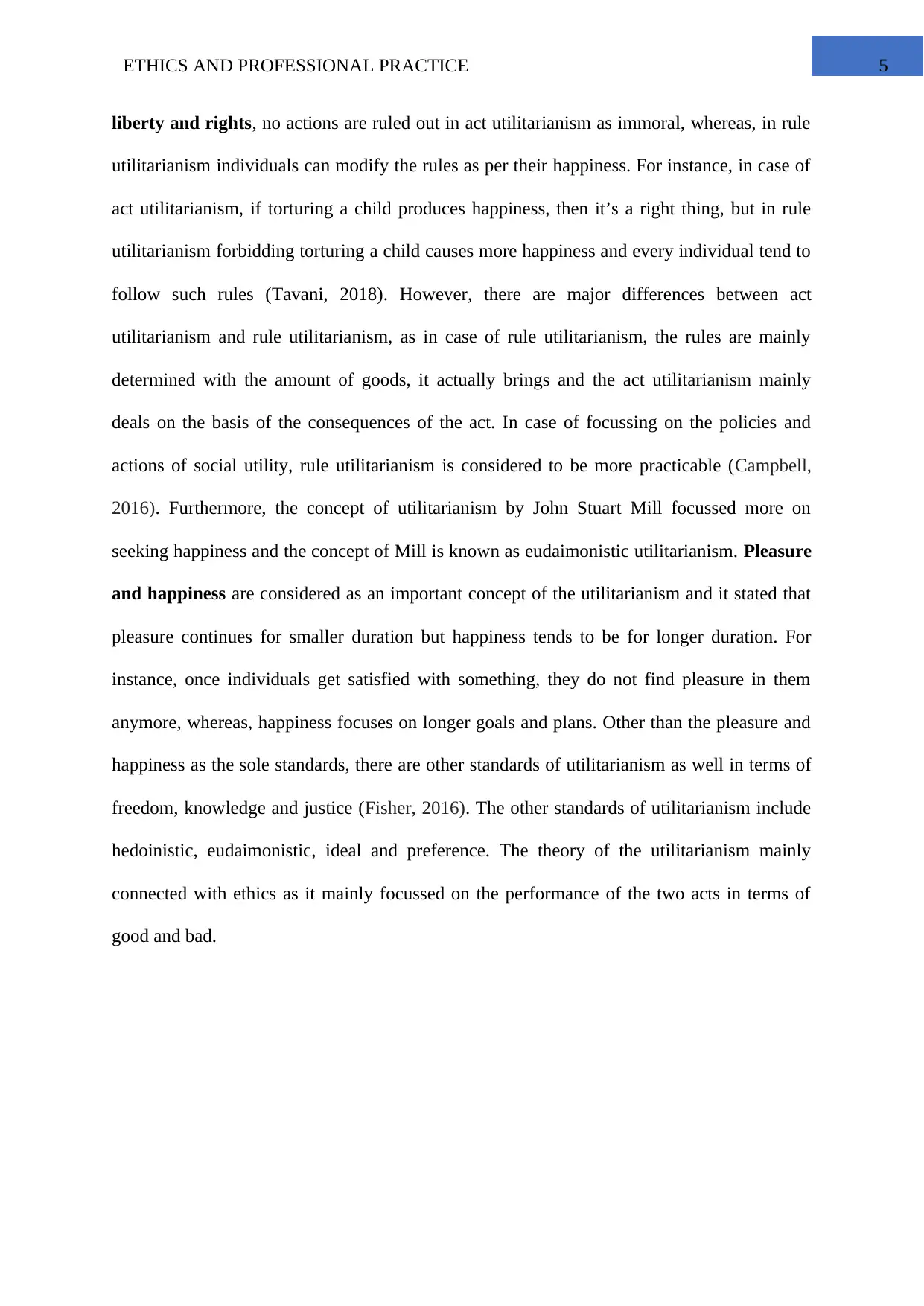
5ETHICS AND PROFESSIONAL PRACTICE
liberty and rights, no actions are ruled out in act utilitarianism as immoral, whereas, in rule
utilitarianism individuals can modify the rules as per their happiness. For instance, in case of
act utilitarianism, if torturing a child produces happiness, then it’s a right thing, but in rule
utilitarianism forbidding torturing a child causes more happiness and every individual tend to
follow such rules (Tavani, 2018). However, there are major differences between act
utilitarianism and rule utilitarianism, as in case of rule utilitarianism, the rules are mainly
determined with the amount of goods, it actually brings and the act utilitarianism mainly
deals on the basis of the consequences of the act. In case of focussing on the policies and
actions of social utility, rule utilitarianism is considered to be more practicable (Campbell,
2016). Furthermore, the concept of utilitarianism by John Stuart Mill focussed more on
seeking happiness and the concept of Mill is known as eudaimonistic utilitarianism. Pleasure
and happiness are considered as an important concept of the utilitarianism and it stated that
pleasure continues for smaller duration but happiness tends to be for longer duration. For
instance, once individuals get satisfied with something, they do not find pleasure in them
anymore, whereas, happiness focuses on longer goals and plans. Other than the pleasure and
happiness as the sole standards, there are other standards of utilitarianism as well in terms of
freedom, knowledge and justice (Fisher, 2016). The other standards of utilitarianism include
hedoinistic, eudaimonistic, ideal and preference. The theory of the utilitarianism mainly
connected with ethics as it mainly focussed on the performance of the two acts in terms of
good and bad.
liberty and rights, no actions are ruled out in act utilitarianism as immoral, whereas, in rule
utilitarianism individuals can modify the rules as per their happiness. For instance, in case of
act utilitarianism, if torturing a child produces happiness, then it’s a right thing, but in rule
utilitarianism forbidding torturing a child causes more happiness and every individual tend to
follow such rules (Tavani, 2018). However, there are major differences between act
utilitarianism and rule utilitarianism, as in case of rule utilitarianism, the rules are mainly
determined with the amount of goods, it actually brings and the act utilitarianism mainly
deals on the basis of the consequences of the act. In case of focussing on the policies and
actions of social utility, rule utilitarianism is considered to be more practicable (Campbell,
2016). Furthermore, the concept of utilitarianism by John Stuart Mill focussed more on
seeking happiness and the concept of Mill is known as eudaimonistic utilitarianism. Pleasure
and happiness are considered as an important concept of the utilitarianism and it stated that
pleasure continues for smaller duration but happiness tends to be for longer duration. For
instance, once individuals get satisfied with something, they do not find pleasure in them
anymore, whereas, happiness focuses on longer goals and plans. Other than the pleasure and
happiness as the sole standards, there are other standards of utilitarianism as well in terms of
freedom, knowledge and justice (Fisher, 2016). The other standards of utilitarianism include
hedoinistic, eudaimonistic, ideal and preference. The theory of the utilitarianism mainly
connected with ethics as it mainly focussed on the performance of the two acts in terms of
good and bad.
⊘ This is a preview!⊘
Do you want full access?
Subscribe today to unlock all pages.

Trusted by 1+ million students worldwide
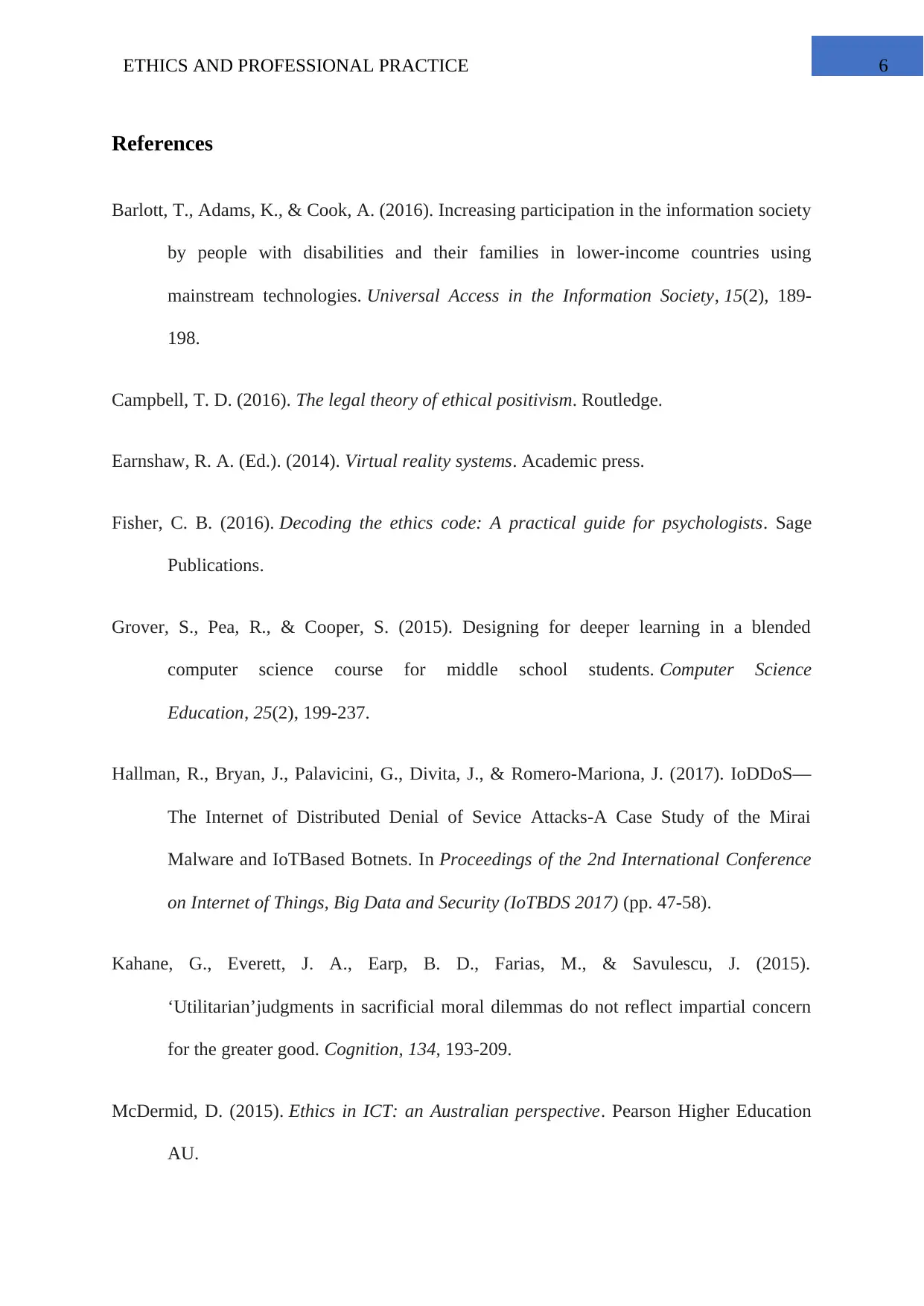
6ETHICS AND PROFESSIONAL PRACTICE
References
Barlott, T., Adams, K., & Cook, A. (2016). Increasing participation in the information society
by people with disabilities and their families in lower-income countries using
mainstream technologies. Universal Access in the Information Society, 15(2), 189-
198.
Campbell, T. D. (2016). The legal theory of ethical positivism. Routledge.
Earnshaw, R. A. (Ed.). (2014). Virtual reality systems. Academic press.
Fisher, C. B. (2016). Decoding the ethics code: A practical guide for psychologists. Sage
Publications.
Grover, S., Pea, R., & Cooper, S. (2015). Designing for deeper learning in a blended
computer science course for middle school students. Computer Science
Education, 25(2), 199-237.
Hallman, R., Bryan, J., Palavicini, G., Divita, J., & Romero-Mariona, J. (2017). IoDDoS—
The Internet of Distributed Denial of Sevice Attacks-A Case Study of the Mirai
Malware and IoTBased Botnets. In Proceedings of the 2nd International Conference
on Internet of Things, Big Data and Security (IoTBDS 2017) (pp. 47-58).
Kahane, G., Everett, J. A., Earp, B. D., Farias, M., & Savulescu, J. (2015).
‘Utilitarian’judgments in sacrificial moral dilemmas do not reflect impartial concern
for the greater good. Cognition, 134, 193-209.
McDermid, D. (2015). Ethics in ICT: an Australian perspective. Pearson Higher Education
AU.
References
Barlott, T., Adams, K., & Cook, A. (2016). Increasing participation in the information society
by people with disabilities and their families in lower-income countries using
mainstream technologies. Universal Access in the Information Society, 15(2), 189-
198.
Campbell, T. D. (2016). The legal theory of ethical positivism. Routledge.
Earnshaw, R. A. (Ed.). (2014). Virtual reality systems. Academic press.
Fisher, C. B. (2016). Decoding the ethics code: A practical guide for psychologists. Sage
Publications.
Grover, S., Pea, R., & Cooper, S. (2015). Designing for deeper learning in a blended
computer science course for middle school students. Computer Science
Education, 25(2), 199-237.
Hallman, R., Bryan, J., Palavicini, G., Divita, J., & Romero-Mariona, J. (2017). IoDDoS—
The Internet of Distributed Denial of Sevice Attacks-A Case Study of the Mirai
Malware and IoTBased Botnets. In Proceedings of the 2nd International Conference
on Internet of Things, Big Data and Security (IoTBDS 2017) (pp. 47-58).
Kahane, G., Everett, J. A., Earp, B. D., Farias, M., & Savulescu, J. (2015).
‘Utilitarian’judgments in sacrificial moral dilemmas do not reflect impartial concern
for the greater good. Cognition, 134, 193-209.
McDermid, D. (2015). Ethics in ICT: an Australian perspective. Pearson Higher Education
AU.
Paraphrase This Document
Need a fresh take? Get an instant paraphrase of this document with our AI Paraphraser
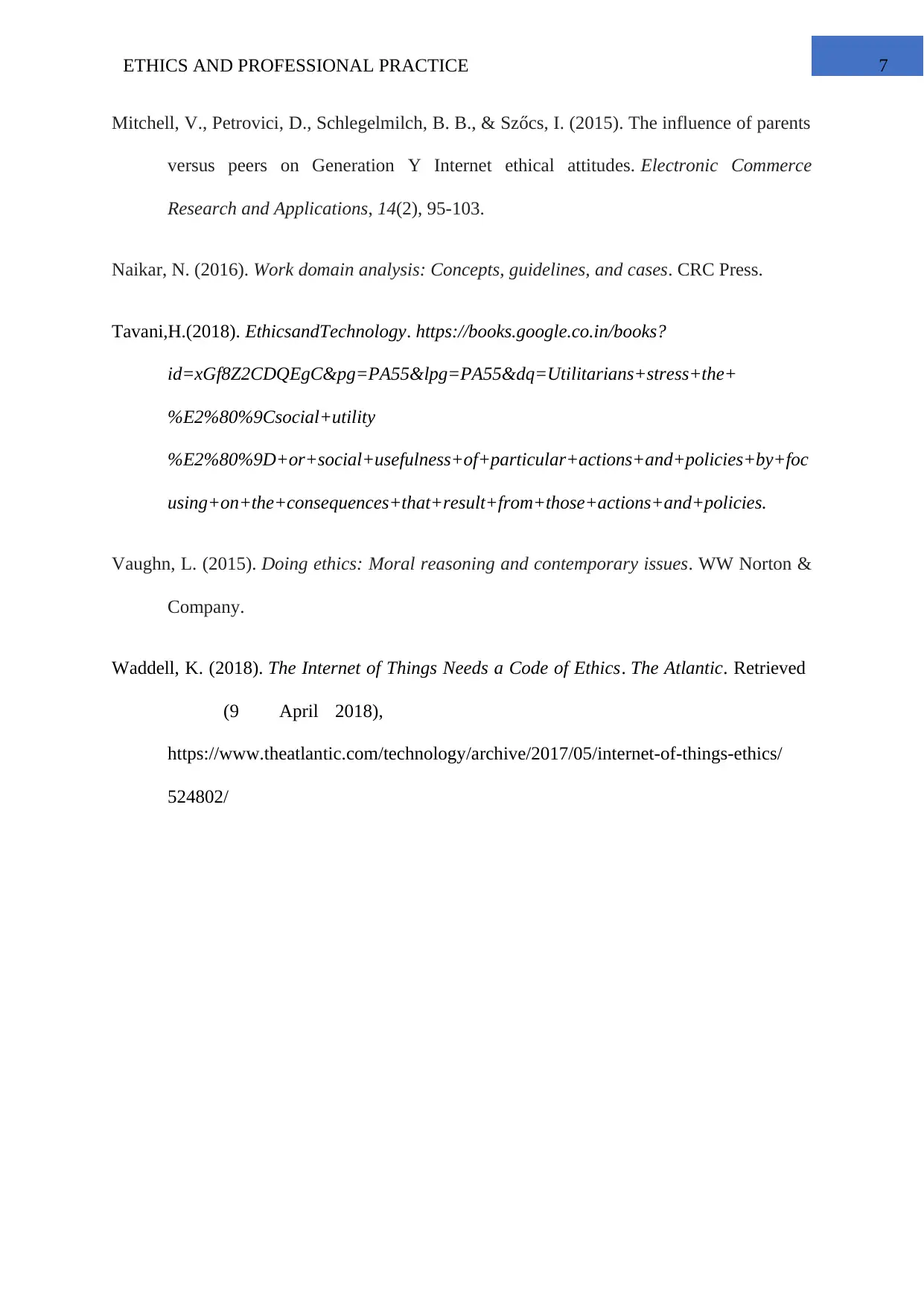
7ETHICS AND PROFESSIONAL PRACTICE
Mitchell, V., Petrovici, D., Schlegelmilch, B. B., & Szőcs, I. (2015). The influence of parents
versus peers on Generation Y Internet ethical attitudes. Electronic Commerce
Research and Applications, 14(2), 95-103.
Naikar, N. (2016). Work domain analysis: Concepts, guidelines, and cases. CRC Press.
Tavani,H.(2018). EthicsandTechnology. https://books.google.co.in/books?
id=xGf8Z2CDQEgC&pg=PA55&lpg=PA55&dq=Utilitarians+stress+the+
%E2%80%9Csocial+utility
%E2%80%9D+or+social+usefulness+of+particular+actions+and+policies+by+foc
using+on+the+consequences+that+result+from+those+actions+and+policies.
Vaughn, L. (2015). Doing ethics: Moral reasoning and contemporary issues. WW Norton &
Company.
Waddell, K. (2018). The Internet of Things Needs a Code of Ethics. The Atlantic. Retrieved
(9 April 2018),
https://www.theatlantic.com/technology/archive/2017/05/internet-of-things-ethics/
524802/
Mitchell, V., Petrovici, D., Schlegelmilch, B. B., & Szőcs, I. (2015). The influence of parents
versus peers on Generation Y Internet ethical attitudes. Electronic Commerce
Research and Applications, 14(2), 95-103.
Naikar, N. (2016). Work domain analysis: Concepts, guidelines, and cases. CRC Press.
Tavani,H.(2018). EthicsandTechnology. https://books.google.co.in/books?
id=xGf8Z2CDQEgC&pg=PA55&lpg=PA55&dq=Utilitarians+stress+the+
%E2%80%9Csocial+utility
%E2%80%9D+or+social+usefulness+of+particular+actions+and+policies+by+foc
using+on+the+consequences+that+result+from+those+actions+and+policies.
Vaughn, L. (2015). Doing ethics: Moral reasoning and contemporary issues. WW Norton &
Company.
Waddell, K. (2018). The Internet of Things Needs a Code of Ethics. The Atlantic. Retrieved
(9 April 2018),
https://www.theatlantic.com/technology/archive/2017/05/internet-of-things-ethics/
524802/
1 out of 8
Related Documents
Your All-in-One AI-Powered Toolkit for Academic Success.
+13062052269
info@desklib.com
Available 24*7 on WhatsApp / Email
![[object Object]](/_next/static/media/star-bottom.7253800d.svg)
Unlock your academic potential
Copyright © 2020–2026 A2Z Services. All Rights Reserved. Developed and managed by ZUCOL.



